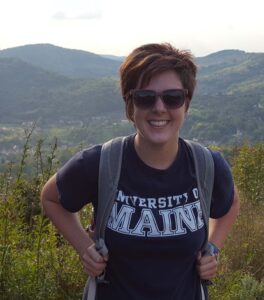Lydia Horne: Seeking collaborative solutions for community-based climate planning
 UMaine doctoral student Lydia Horne is collaboratively leading a new project to help tourism-dependent communities in Maine plan for climate change.
UMaine doctoral student Lydia Horne is collaboratively leading a new project to help tourism-dependent communities in Maine plan for climate change.
Doctoral degree program: Ecology and Environmental Sciences
Research program: NRT: Enhancing Conservation Science and Practice
Advisor(s): Sandra de Urioste-Stone
Mitchell Center project: We’re All in This Together: Participatory Planning for Community-Based Climate Change Adaptation
Feature story on Lydia’s work: ‘We’re all in this together’: Students lead climate-planning project (Dec. 2020)
What problem/s are you working to solve?
Climate change is a huge, global challenge and yet we’re already experiencing impacts right here in Maine. In my research, I’ve found that Maine communities are already affected by climate change and want to do something to address these changes. Some communities are leading the way in climate change preparations while others have limited capacity to cope. Our project is trying to build community capacity to alleviate the negative impacts Maine communities might face from climate change while also taking advantage of new opportunities.
What progress are you making toward solutions?
We know that climate change is affecting Maine communities and will continue to impact our state. Communities are already grappling with a range of other pressing challenges that may feel more immediate. One of our goals is to help put climate change on the planning agenda so that Maine communities are prepared to act. By co-developing adaptation strategies with partners, we hope to find ways forward that work with community resources, values and visions.
How could your findings contribute to a sustainable future in Maine and beyond?
We believe this framework will help many communities throughout the state that are dependent on natural resources. We are initially focusing on pilot communities that rely heavily on tourism and outdoor recreation for their economies, but we see no reason why these participatory workshops could not be applied to other professions such as forestry, fishing and agriculture.
Why did you get involved with this Mitchell Center project?
We’re pretty lucky at UMaine to have a place like the Mitchell Center that is very applied and solutions-oriented. When we saw the call for proposals, we thought this would be a good opportunity to further connect the university with Maine communities. There is this narrative that academics live in the proverbial “ivory tower” and their research is purely for scientific inquiry. Our Mitchell Center project hopes to achieve the opposite effect, where our participatory workshop framework is co-developed with community partners to directly help communities plan for environmental change.
What do you like best about working on an interdisciplinary team? What is most challenging?
This team is awesome! It’s really fun to work with people who come to the table with different knowledge and different ways of thinking. Of course, this can be a challenge too! Interdisciplinary projects force you to get outside your comfort zone, but that’s where you grow as a researcher and as a communicator. We often ask, “What are we talking about?” or “What do we mean by that?” These questions may seem basic, but they lead us to a greater understanding of the project and force us to be clearer about what we’re trying to accomplish. It’s a bit of a messy process but also a very creative process that fosters thinking outside the box.
What do you find rewarding about collaborating with stakeholders? Most challenging?
We’re just getting started launching this project and hope to really engage with our community partners as we move into the fall. As students, we were really thrilled at the community interest in this project idea and that partners were willing to “take a chance” working with a student-led team. Stakeholder engagement is central to our project, as our primary goal is to produce a participatory framework that directly benefits community decision-making.
What sustains you?
Working with good, interesting people. If you have a collaborative, fun team, it’s exciting to start new projects. Also, teaching! I know teachers and students alike don’t know what to expect for the fall semester, but I’m still really psyched to be teaching remotely.
Where do you hope to be in five years?
I can barely think about where I’ll be in the next month, let alone five years! I stayed on for a Ph.D. so that I could eventually get a faculty position. That seems possible in the next five years!
